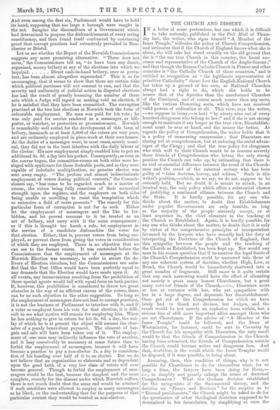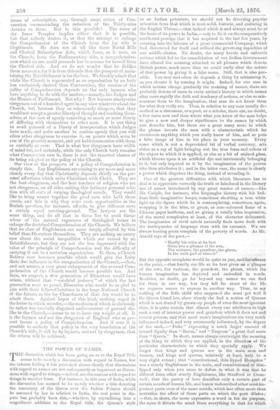THE CHURCH AND DISSENT.
IN a letter of some pretensions, but one which it is difficult to take seriously, published in the Pall Mall of Thurs- day last, the writer, who signs himself " A Member of the Inner Temple," ridicules the policy of Church Comprehension, and intimates that if the Church of England knows what she is about, she will take her stand steadily on the old ground that she is " the one true Church in this country, the lineal suc- cessor and representative of the Church of the Anglo-Saxons ;" and that though the Roman Catholic Church in France and other countries is " the Catholic Church of those countries," and is entitled to recognition as " the legitimate representative of primitive Catholicity " there, here the English National Church has taken up a ground of her own, as National Churches always had a right to do, which she holds to be nearer that of the Apostles than the unreformed Churches of the Continent, and of course much nearer than any sects, like the various Dissenting sects, which have not received valid powers of ordination at all. This view, says the writer, —we suppose in irony,—is held " by ninety-nine out of every hundred clergymen who belong to her;" and if she is not strong enough to maintain it any longer as the true view, Disestablish- ment must be near at hand, and the nearer the better. As regards the policy of Comprehension, the writer holds that it is a policy of unmeaning compromise ; that Dissenters are aiming not at comprehension, but at reducing the social advan- tages of the Clergy ; and .that the true policy for clergymen who wish well to their Church would be to censure severely those friends of Comprehension who betray the only strong position the Church can take up, by intimating that there is no real or essential difference between the creed of the Church- man and the creed of the external sectary who has been guilty of "false doctrine, heresy, and schism." Such is this writer's position,—which, as we say, we do not suppose to be seriously held. But no doubt it is meant to attack, in an ironical way, the only policy which offers a substantial chance of justifying a continued alliance between the Church and the State. It is hardly possible, for any one who thinks about the matter, to doubt that Establishments under popular Governments are only feasible, so long as the majority of the people sincerely accept, or at least acquiesce in, the chief elements in the teaching of the Church so Established. Again, it is hardly possible, for any one who thinks about the matter, to doubt that it is only by virtue of the comprehensive principles of interpretation favoured by the lawyers who have recently had the duty of interpreting the Doctrines of the Church of England, that this sympathy between the people and the teaching of the Church as Established, has been kept up. Nor would any man in his reason question that if to-morrow the legal limits of the Church's Comprehension could be narrowed into those of any one coherent system of doctrine, whether High, Low, or Broad, the Church would be immediately shattered into a great number of fragments. Still more is it quite certain that any such narrowing would have the effect of alienating not merely a great many honest Churchmen, but a great many external friends of the Church,—i.e., Dissenters more or less at variance with her, who yet sympathise with her in a large degree, and deprecate her disestablishment. Once get rid of the Comprehension for which we have lately had to thank not divines, but Judges, and the result would be not merely an explosion from within, but a serious loss of still more important allies amongst those who are not Churchmen. If the advice of "A Member of the Inner Temple" could be followed, and the Dean of Westminster, for instance, could be sent to Coventry by the Church for his sympathy with Dissenters, the only result would be that the friends of Comprehension in the Church having been ostracised, the friends of Comprehension outside • the Church would become active and dangerous foes. And that, doubtless, is the result which the Inner Templar would be disposed, if it were possible, to bring about.
Assuming, then, this condition of things, why is it not possible for Churchmen to do for themselves what, for so long a time, the lawyers have been doing for them,- i.e., to simplify and greatly enlarge the terms of doctrinal Comprehension ? What the Gorham decision established for the antagonist' of the Sacramental theory, and the decision ron "Essays and Reviews" for the sceptics as to "Eternal punishments," the Church ;night be asked to do for the questioners of other theological doctrines supposed to be determined in her formularies, by simplifying at once the terms of subscription, say, through some action of Con- vocation recommending the reduction of the Thirty-nine Articles to three. But is this possible ? The sneer of the Inner Templar implies either that it is possible, but that nobody desires it, or that the attempt to enlarge the Comprehension of the Church from the lay side is illegitimate. He does not at all like these Burial Bills and Clerical Subscription Acts, which force, as it were, on the Church, from the Parliamentary side, a comprehensive- ness which no one could persuade her to assume for herself from the Clerical side. And we do not wonder that he dislikes these measures, for it is from this side that the prospect of main- taining the Establishment is far the best. We frankly admit that while the Church is represented as an organisation by no body less exclusively clerical than Convocation, the success of the policy of Comprehension depends on the only laymen who have anything to do with the matter,—namely, the Judges and the Houses of Parliament. But why ? Not because ninety-nine clergymen out of a hundred agree in any view whatever about the Church, but because they so vehemently disagree, that they would not accept a greater liberty of thought and teaching them- selves, at the cost of openly conceding as much or more liberty of differing with themselves to other men. It is one thing to avail yourself of a liberty of interpretation which Judges have made, and quite another to confess openly that you will allow other clergymen to exercise it, on points which seem to you of the greatest moment, and yet hold communion with them as cordially as ever. That is what few clergymen have width of mind for; and certainly, while the only Church body remains what Convocation now is, there is not the remotest chance of its being adopted as the policy of the Church. Our view of the prospects of a policy of Comprehension is simply this. Lay Englishmen are coming to see more and more clearly every day that Christianity depends chiefly on the per- sonal affections which unite Christians with Christ. They see the best clergymen, and the best teachers of religion who are not clergymen, on all sides uniting this intimate personal rela- tion with all sorts of varying theological creeds. They would like to bring nearer together the good men who hold these creeds, and this is why they seize such opportunities as the Burials question, for instance, affords, to give different sects a certain equal meeting-ground. The lawyers see the same thing, and do all that in them lies to avail them- selves of the natural vagueness of theological terms to enlarge the doctrinal Comprehension of the Church. We believe that no class of Englishmen are more deeply affected by this belief than Dissenters themselves. They are making an outcry now about the social inequalities which aro caused by an Establishment, but they are not the less impressed with the value of the principle of Comprehension and the difficulty of carrying it out in a sectarian organisation. IF, then, a Church Reform ever becomes possible which would give the Laity their due influence in the reorganisation of the Church,—then, and not sooner, a very great enlargement of the avowed Com- prehension of the Church would become possible too. And then, we suspect, a dew generation of Dissenters would have arisen, without that " watchful jealousy " of which the last generation were so proud, Dissenters who would be as glad to join with their fellow-Christians in the large National Church of the future, as the lay Churchmen of that day would be to admit them. Against hopes of this kind, nothing urged in the letter to which we refer,—the weakness of which is obviously its rather too carefully disguised under-current of general dis- like to the Church,—seems to us to have any weight at all. It- is the laymen and not the clergymen of England who at pre- sent favour a policy of Comprehension. And if ever it is possible to embody that policy in the very foundation of the Church's title, it will be by laymen, and not by clergymen, that the reform will be achieved.



































 Previous page
Previous page